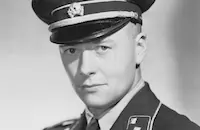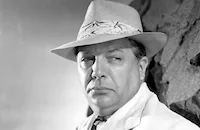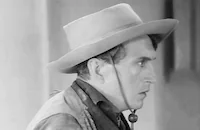The Fargo Kid

Brief Synopsis
Cast & Crew
Edward Killy
Tim Holt
Ray Whitley
Emmett Lynn
Jane Drummond
Cyrus W. Kendall
Film Details
Technical Specs

Synopsis
In the small Arizona town of Micaville, prospector Nick Kane tries to persuade Caleb Winters into selling his land, and even tries to enlist the help of Caleb's wife Sarah to convince him to sell. Caleb, however, refuses to give up his mining claim, and insists that there is gold on the land. Meanwhile, on the outskirts of Micaville, the Fargo Kid, who is on his way to join his buddies Johnny and Whopper in town, becomes stranded when his horse suffers a broken leg. In the desert, the Fargo Kid meets Deuce Mallory, a hired gun who is headed for Micaville to kill a man. Mallory proposes a game of cards to determine who will ride his horse into town, but when he loses he pulls a gun on the Kid. The Kid, however, overpowers Mallory and rides off with his horse. Because of the horse, the Kid is mistaken for the outlawed gunslinger and is awarded with the five-thousand-dollar payment that Mallory was to receive for killing Caleb Winters, an old prospector. His interest piqued, the Kid decides to assume the gunman's identity until he can get to the bottom of the murder plot. Complications arise when the real Mallory rides into town and, seeing a notice offering a one-thousand-dollar reward for his capture, tips off Whopper and the sheriff that the man they want is the owner of the copper sorrel horse hitched outside the saloon. When the sheriff and a large crowd of men capture the Kid, Whopper comes to his rescue by starting a brawl over the reward money, thus creating a diversion long enough for the Kid to escape. While Johnny and Whopper are jailed for their complicity in the Kid's escape, the Kid learns that Nick Kane and Bush Cleveland want to kill Caleb in order to steal the rich vein of gold running through his claim. The Kid marches the men out to his ranch at gunpoint and forces them to confess to Caleb. After Johnny and Whopper are released from jail, they trail the sheriff to Winters' place, where a scuffle breaks out and Kane is shot. Before leaving town, Fargo asks Jennie, Caleb's daughter, for a hairpin, then extracts the five-thousand dollars he had hidden in the shaft of his shotgun.

Director
Edward Killy
Cast

Tim Holt

Ray Whitley
Emmett Lynn
Jane Drummond

Cyrus W. Kendall
Ernie Adams

Paul Fix
Paul Scardon

Glenn Strange

Mary Maclaren

Dick Hogan
Herman Nowlin
Hayden Stevenson

Lee Phelps
Carl Stockdale
Harry Harvey
Crew
Nan Blake
Lucius Croxton
William Dorfman
Bert Gilroy
Morton Grant
John C. Grubb
Arthur V. Jones
Frederic Knudtson
John Leipold
Lee Marcus
Van Nest Polglase
Fred Rose
Paul Sawtell
Ray Whitley
Harry Wild

Film Details
Technical Specs

Articles
The Fargo Kid -
By Glenn Erickson

The Fargo Kid -
Quotes
Trivia
Notes
According to contemporary sources, this film was filmed partially in Kanab, Utah. Hollywood Reporter news items indicate that The Fargo Kid was filmed simultaneously with Holt's Wagon Train (see below). According to the file for the film in the MPAA/PCA Collection at the AMPAS Library, on August 2, 1940 the Hays office sent a letter to RKO, warning the studio to use care in scenes showing drinking and horses falling. The Hays office also told RKO to change a scene in which "Bush" is being choked by "Nick," and suggested that "Nick merely shake Bush." In addition, RKO was asked to "show the crooks actually turned over to the sheriff and the posse...so that it will be quite clear to the audience that the crooks are going to be punished." For information on other films based on Tuttle's story see entry for the 1933 version of The Cheyenne Kid above.














